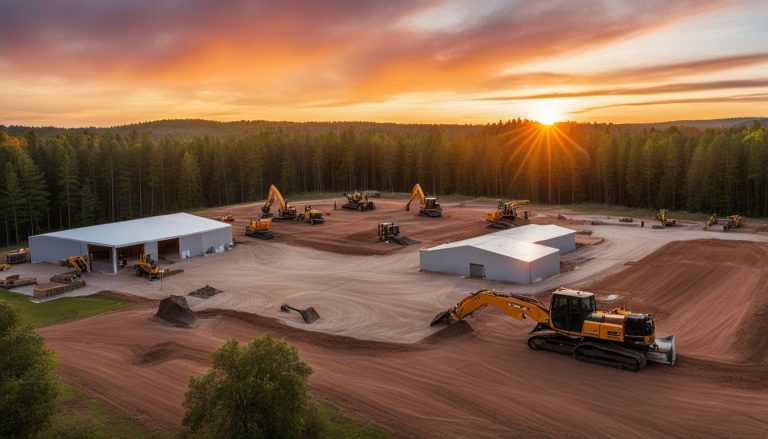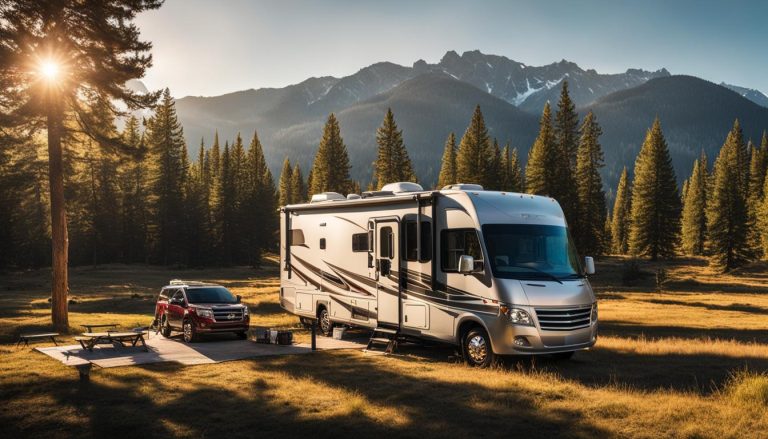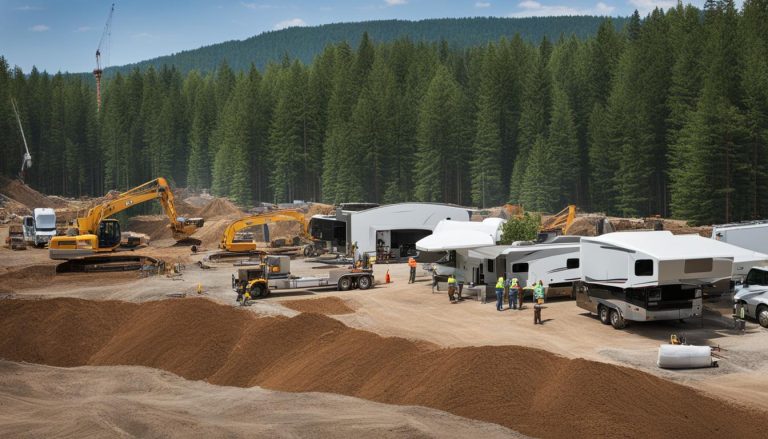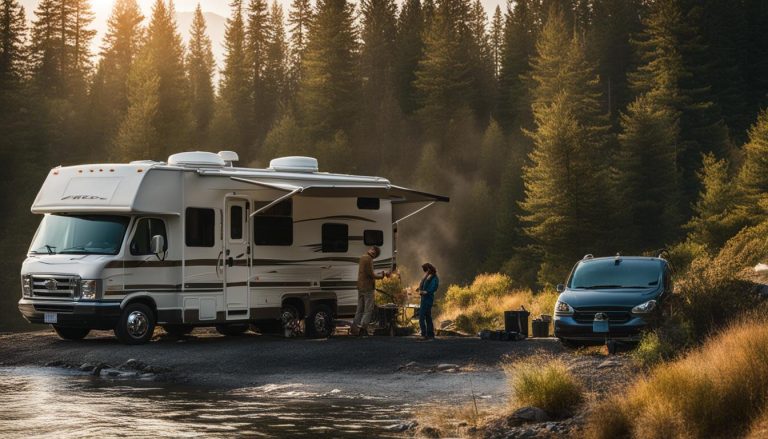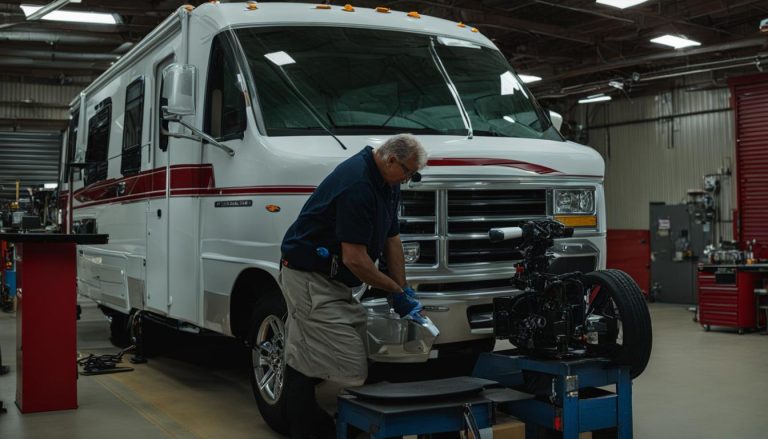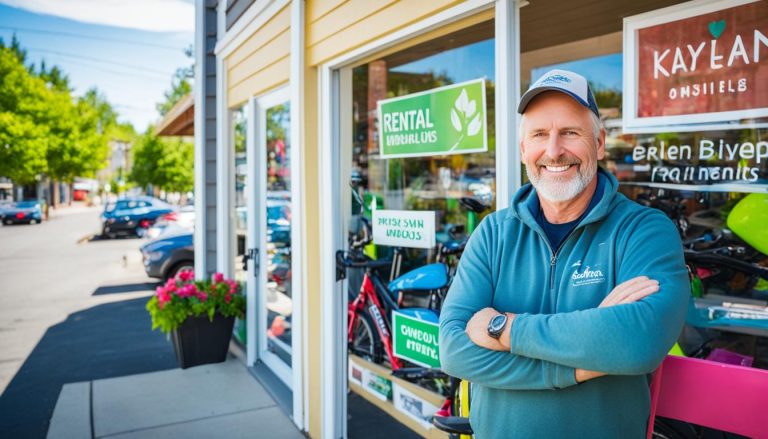Start an RV Park Today: Essential Steps & Tips
gorvlifestyle.com and its partners may earn a commission if you purchase a product through one of our links
Welcome to our comprehensive guide on how to open an RV park. Whether you are a seasoned entrepreneur or an adventurous individual looking to capitalize on the booming camping industry, starting an RV park can be a lucrative venture. With the rising popularity of RV travel and outdoor recreation, a well-planned and well-managed RV park can attract a steady stream of campers all year round.
Opening an RV park requires careful planning and attention to detail. From finding the perfect location to designing the park layout and managing the business, each step plays a crucial role in creating a successful and profitable venture. In this guide, we will take you through the essential steps and tips to help you start your own RV park and maximize its potential.
Key Takeaways:
- Look for a spacious and well-located plot of land for your RV park.
- Consider the amenities and attractions in the area to attract campers.
- Divide the land into RV sites with necessary hookups and facilities.
- Ensure proper staffing and management for excellent customer service.
- Create a strategic marketing plan to promote your RV park effectively.
- Stay compliant with legal requirements and consider the financial aspects of running an RV park.
Location and Land Acquisition
When starting an RV park, one of the first and most crucial steps is finding the perfect location and acquiring the right parcel of land. Consider the following tips and guidelines to ensure a successful RV park startup process:
1. Size and Privacy
Look for a plot of land that is at least 3 acres in size, allowing ample space for RV sites, amenities, and open areas. Private and quiet locations away from noisy roads or highways provide a more peaceful camping experience for guests.
2. Proximity to Attractions
To attract more campers, consider the proximity of the land to popular attractions such as hiking trails, lakes, beaches, or other recreational areas. Being near these amenities can greatly enhance the appeal of your RV park.
3. Building and Zoning Codes
Check the building or zoning codes in your area to understand the specific requirements for opening a campground or RV park. This includes determining the minimum land size required for this type of business.
4. Shape and Layout
When choosing a piece of land, consider its shape and layout. The available space and configuration will impact the number of RV campsites you can accommodate. Plan your layout carefully to optimize functionality and guest comfort.
5. Utility Placement
Strategically plan the placement of essential utilities such as water, sewer, and electric hookups. Ensuring convenient access to these services at each campsite will enhance the overall camping experience for your guests.
| Location Factors | Tips |
|---|---|
| Size and Privacy | Look for at least 3 acres of private land away from busy roads or highways. |
| Proximity to Attractions | Consider locations near hiking trails, lakes, or beaches to attract more campers. |
| Building and Zoning Codes | Ensure compliance with local regulations and determine the required land size for an RV park. |
| Shape and Layout | Consider the shape and layout of the land when planning the number of RV campsites. |
| Utility Placement | Strategically plan the placement of water, sewer, and electric hookups for convenience. |
RV Park Design and Construction
Designing and constructing your RV park requires careful planning and attention to detail. By following these steps, you can create a comfortable and attractive environment for your guests.
- Divide the land into RV sites that are at least 1,500 sq ft in size to provide ample space for campers.
- Opt for a mix of regular and extra-long sites to accommodate different RV sizes and maximize your park’s potential.
- Run water, sewer, and electric hookups to each campsite to ensure guest comfort and convenience.
- Install concrete or gravel pads to provide level parking areas for RVs, promoting stability during the stay.
- Design roads that are wide enough to accommodate larger vehicles and consider using one-way roads for efficient traffic flow.
- Consider adding essential amenities like clean bathrooms, showers, and a clubhouse for guest convenience and socialization.
- Explore the option of adding desirable recreational facilities like a pool or fitness center to make your park more attractive to guests.
By carefully considering the design and construction of your RV park, you can create a welcoming environment that appeals to RV enthusiasts and ensures a memorable experience for your guests.
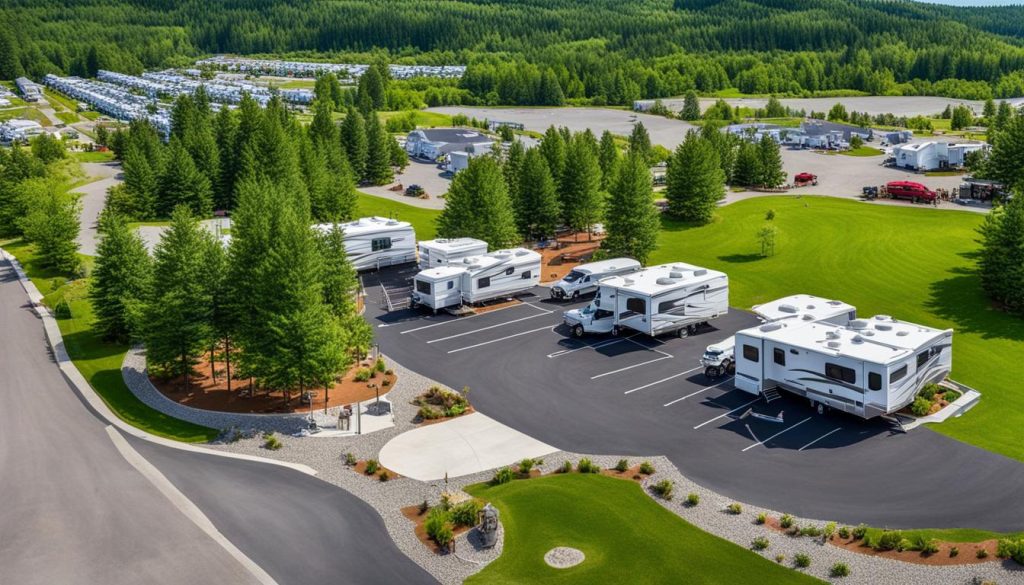
Image Alt Tag: rv park business plan opening a recreational vehicle park
Staffing and Management
Starting a successful RV park requires effective staffing and efficient management. To ensure a positive experience for your guests and maximize revenue, consider the following strategies:
-
Hire staff members with excellent organizational skills and a strong commitment to customer service. Friendly and knowledgeable staff can create a welcoming atmosphere for campers and address their needs effectively.
-
Consider hiring groundskeepers who can maintain the sites and perform general maintenance tasks. Clean and well-maintained facilities contribute to the overall satisfaction of your guests.
-
Have a plumber or electrician on-site to handle any hookup problems or concerns that may arise. This ensures prompt resolution of issues and prevents inconvenience for your guests.
-
Train your staff to provide consistent levels of customer service. Implement training programs to enhance their skills in dealing with guests, resolving conflicts, and managing daily operations.
-
Adjust your park’s prices based on the peak season and off-season demand. By optimizing pricing strategies, you can attract more campers during high-demand periods and maintain steady revenue during slower periods.
-
Clearly post and enforce the park’s rules to ensure a peaceful and enjoyable experience for all guests. Effective rule enforcement helps maintain a harmonious environment and mitigates potential disputes.
-
Offer an on-site market where guests can purchase common necessities. This not only generates additional income but also provides convenience for campers who may need essential supplies during their stay.
By focusing on staffing and management, you can provide exceptional service and create an environment that attracts and satisfies your guests.
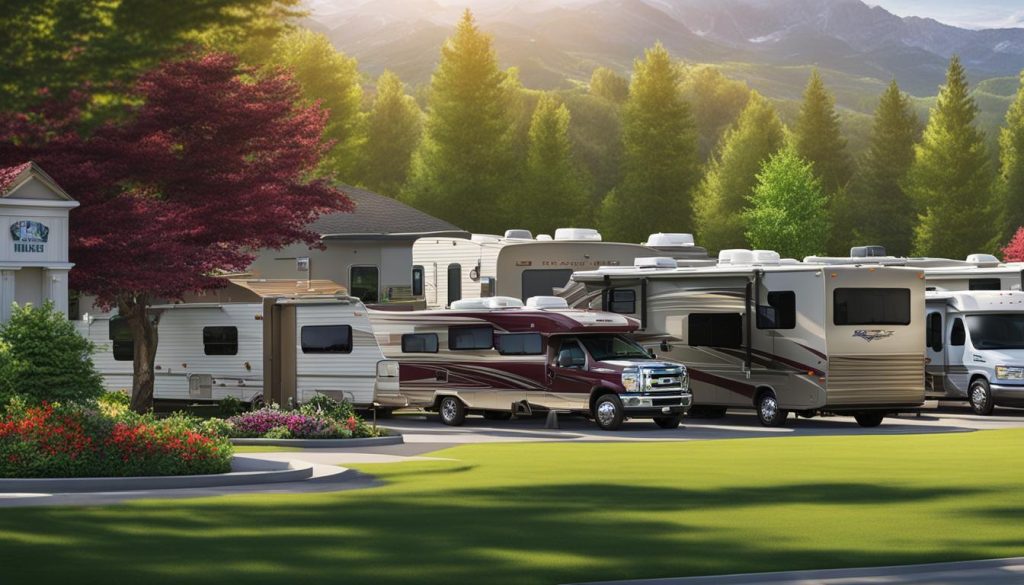
Marketing and Promotion
When it comes to opening a recreational vehicle park, effective marketing and promotion play a crucial role in attracting guests and boosting your business’s success. Here are some key strategies to consider:
- Create a compelling website: Establish an online presence for your RV park by creating a user-friendly website that provides detailed information about your amenities, services, and location. Make sure to optimize your website with relevant keywords such as “rv park business plan” and “opening a recreational vehicle park” to improve your search engine rankings.
- Utilize social media platforms: Take advantage of popular social media platforms like Facebook, Twitter, and YouTube to promote your park and engage with potential customers. Share engaging content such as stunning photos of your park, testimonials from satisfied guests, and announcements about upcoming events or promotions.
- Showcase your park’s offerings: On your website, display a list of your park’s rules and amenities to give potential guests a clear picture of what they can expect during their stay. You can also create brochures or handouts that highlight the unique features and attractions of your park.
- Sell branded merchandise: Consider selling branded merchandise like T-shirts or bags that feature your park’s logo to promote your business and create a sense of community among your guests.
- Offer WiFi access: In today’s connected world, providing WiFi access is essential for many RV travelers. Make sure your park offers reliable and high-speed internet connectivity to meet the needs of your guests. Additionally, consider setting up a dedicated computer room for guests who may not have their own devices.
- Encourage guest feedback: Actively seek feedback from your guests to gain insights into their experiences and identify areas for improvement. Implementing suggestions and addressing concerns will help you enhance your services and create a positive reputation for your park.
By implementing these marketing strategies, you can effectively promote your RV park, attract a wider audience, and ensure the success of your business.
Legal Considerations and Business Structure
When starting an RV park, it’s important to understand the legal considerations and choose the right business structure. Here are some key steps to help you navigate this process:
Research and Compliance
First and foremost, research and comply with the zoning and land use regulations specific to your area. Each jurisdiction may have different requirements for RV parks, so it’s crucial to understand and adhere to these rules.
Obtain Permits and Licenses
Next, obtain the necessary permits and licenses to operate your RV park legally. This typically includes a business license and health department permits. Check with your local government agencies to determine the specific permits required for your location.
Choosing a Business Structure
Consider structuring your RV park as a corporation or limited liability company (LLC) for tax advantages and liability protection. These business structures can offer personal asset protection and potentially reduce your tax burden. Consult with a legal professional or business advisor to determine the most suitable structure for your park.
Selecting a Unique Name
Choose a unique and legally available name for your RV park. A distinctive name can help distinguish your park from competitors and create a memorable brand. Additionally, you may consider registering a “Doing Business As” (DBA) name if desired.
Registering Your Business
File the necessary paperwork to register your corporation or LLC with your state. This typically involves submitting formation documents and paying a filing fee. Once registered, you will receive a unique employer identification number (EIN) from the IRS, which is used for tax purposes.
Insurance Coverage
Secure the appropriate insurance coverage for your RV park to protect against potential liabilities. This may include general liability insurance, property insurance, and workers’ compensation insurance, depending on the specific needs of your park. Work with an insurance agent who specializes in the hospitality and recreation industry to ensure you have comprehensive coverage.
Business Bank Account
Open a business bank account to track cash flow and manage your finances. Separating your personal and business accounts helps maintain clear financial records and simplifies tax reporting. Seek advice from a financial professional to select the best banking options for your RV park.
By following these legal considerations and establishing a solid business structure, you’ll set your RV park up for success. Now let’s move on to the financial considerations in section 7.
Legal Considerations and Business Structure Checklist
| Steps | Description |
|---|---|
| Research and Compliance | Thoroughly research zoning and land use regulations in your area and ensure compliance. |
| Obtain Permits and Licenses | Acquire the necessary permits and licenses, depending on your local requirements. |
| Choose a Business Structure | Select whether to structure your RV park as a corporation or limited liability company (LLC) for tax advantages and liability protection. |
| Selecting a Unique Name | Choose a unique and legally available name for your RV park. Consider registering a “Doing Business As” (DBA) if desired. |
| Registering Your Business | File the necessary paperwork to register your corporation or LLC with your state and obtain an employer identification number (EIN) from the IRS. |
| Insurance Coverage | Secure the appropriate insurance coverage for your RV park to protect against potential liabilities. |
| Business Bank Account | Open a business bank account to track cash flow and manage your finances. |
Financial Considerations
Starting an RV park requires careful financial planning to ensure long-term success. Estimating your startup costs is crucial in creating a solid business plan. Consider factors such as land acquisition, construction, utilities, and amenities when calculating your initial investment.
Financing options are available to help you fund your RV park venture. Explore government assistance programs, approach commercial lenders, or seek private investors who may be interested in partnering with you. Consider discussing your business plan and financial projections with potential investors or lenders to increase your chances of securing the necessary funding.
Once your RV park is up and running, it is important to budget for ongoing expenses. These can include payroll for your staff, utility bills, insurance premiums, and marketing costs. By accurately estimating and monitoring your expenses, you can make informed decisions to maximize profitability.
Regularly monitor your revenue and expenses to ensure the financial health of your RV park. Analyze your financial statements and make adjustments as needed. By staying on top of your financials, you can identify areas for improvement, make strategic decisions, and ensure the long-term success of your RV park business.
FAQ
How do I open an RV park?
To open an RV park, you’ll need to find a plot of land that is at least 3 acres in size, away from noisy roads or highways. Consider the proximity to attractions like hiking trails, lakes, or beaches. Divide the land into RV sites that are at least 1,500 sq ft in size and have water, sewer, and electric hookups run to each campsite. Install concrete or gravel pads for parking and design wide roads for easy traffic flow. Provide sanitary facilities like bathrooms and showers, and consider adding amenities like a pool or fitness center.
What should I consider when choosing a location for my RV park?
When choosing a location for your RV park, consider factors such as land size, noise levels, and proximity to attractions. Look for a plot of land that is at least 3 acres in size and away from noisy roads or highways. Consider the proximity to hiking trails, lakes, or beaches, as these attractions can attract more campers to your park.
How should I design and construct my RV park?
When designing and constructing your RV park, divide the land into RV sites that are at least 1,500 sq ft in size. Run water, sewer, and electric hookups to each campsite for guest comfort. Install concrete or gravel pads to provide level parking areas for RVs. Design wide roads for easy traffic flow, and consider adding pull-through campsites for convenience. Provide sanitary facilities like bathrooms and showers, and consider adding a clubhouse for socializing. Adding amenities like a pool or fitness center can also make your park more desirable.
What staffing and management considerations should I keep in mind?
When it comes to staffing and management, hire individuals with good organizational skills and customer service abilities. Consider hiring groundskeepers to maintain the sites and perform general maintenance tasks. Have a plumber or electrician on-site to address any hookup problems or concerns. Train your staff to provide consistent levels of customer service to ensure guest satisfaction.
How should I market and promote my RV park?
To market and promote your RV park, create a website to provide information and attract potential customers. Utilize social media platforms like Facebook, Twitter, and YouTube to promote your park and engage with customers. Clearly post and enforce the park’s rules to ensure a peaceful and enjoyable experience for all guests. Consider offering branded merchandise like T-shirts or bags to promote your park. Provide WiFi for guests and encourage guest feedback to improve your park’s services.
What legal considerations should I keep in mind when opening an RV park?
When opening an RV park, research and comply with the zoning and land use regulations in your area. Obtain the necessary permits and licenses, including a business license and health department permits. Consider structuring your RV park as a corporation or limited liability company (LLC) for tax advantages and liability protection. Choose a unique and legally available name for your park and consider a DBA if desired. File your corporation or LLC with your state and obtain an employer identification number (EIN). Secure the appropriate insurance coverage for your park to protect against potential liabilities.
What financial considerations should I keep in mind when starting an RV park?
When starting an RV park, estimate your startup costs based on factors like land acquisition, construction, utilities, and amenities. Consider financing options such as government assistance, commercial lenders, or private investors. Budget for ongoing expenses like payroll, utilities, insurance, and marketing. Monitor your revenue and expenses closely to ensure profitability and make adjustments as needed.

